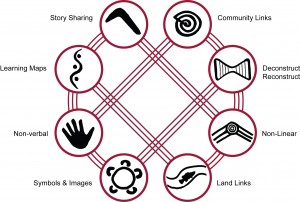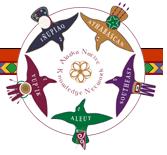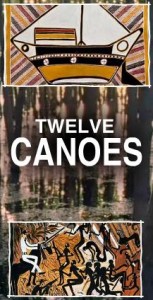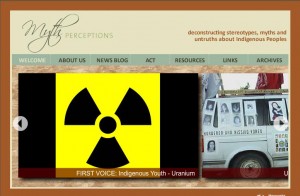8 Ways
I came across this site while searching “aboriginal education”. It is a site designed and maintained by the Western New South Wales Regional Aboriginal Education Team and James Cook University in Australia. It is a pedagogical framework for teachers to be able to teach Aboriginal students in a meaningful way. It discusses and has resources about Aboriginal perspectives and how to include them into the core curriculum that is set by the school boards and governments.
October 11, 2010 No Comments
Alaska Native Knowledge Network


This site states its purpose as “resources for compiling and exchanging information related to Alaska native knowledge systems and ways of knowing.” There are lot of resources concerning curriculum, information on cultural research systems, and cultural maps.
October 11, 2010 No Comments
4 Directions Teachings
This site is by Canadian Heritage. Its objective is “a visually stunning audio narrated resource for learning about  Indigenous knowledge and philosophy five diverse First Nations in Canada”.
Indigenous knowledge and philosophy five diverse First Nations in Canada”.
October 11, 2010 No Comments
New South Wales Aboriginal Ed
Here’s a site from the New South Wales Government in Australia. It is dedicated to Aboriginal Education. It provides examples of context-based teaching and learning projects to be used. It is obvious that the values of the Aboriginal people are considered. They address Aboriginal art and languages, and contextualize math, science, and literature for the students.
October 11, 2010 No Comments
12 Canoes
I found this site that is to educate people about the Yolngu people of Ramingining in Australia’s Northern Territory. The website is a great use of technology and educating others. They have provided a study guide for teachers and students. It is quite interactive and divides up the culture so that you can explore the art, music, the people, etc. It shows what is important to the people in a very easy to follow way.
October 11, 2010 No Comments
Global Literature
I came across the “Indigenous People’s Literature” site while searching the word “indigenous”. It’s a little different from some of the other sites in that it contains information and links for Indigenous people all over the world. There are external links as well to continue the research process. I liked how it is a global site.
September 24, 2010 No Comments
Language Resource
I have found the “The First Nations Languages of British Columbia” site. It has a variety of other links to external sites and a database of the actual languages found in BC. There are references to development intiatives and dictionaries available.
September 24, 2010 1 Comment
Alberta’s Information Connection
The University of Alberta has put together the “First Nations Information Connection” . You will be able to find articles, journals, books, and other publications through this site. Most of the resources are freely accessible and easy to find.
September 19, 2010 No Comments
MythPerceptions
Myth Perceptions is a site that I came across that might help people understand First Nations culture better. Many people (not necessarily those taking this course) but cultural misconceptions and stereotypes exist (regardless of the culture). This site provides information to demystify those ideas. It also presents issues that First Nations people face.
September 19, 2010 No Comments
Tradition and Literature
I came across the “Using First Nations Traditional Literature in the Classroom” site. It is created by the Saskatoon Public Schools Online Resources Centre. It provides educational resources to teachers. There are outlined activities for oral tradition, examining folklore, and story-telling. These are all important aspects to First Nations culture. This site helps to keep those alive for students and teaches them about those traditions. This can be useful to help educators incorporate tradition and culture into the classroom.
September 19, 2010 No Comments





